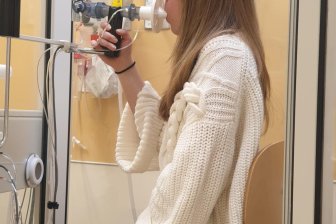Alberta hospitals have had more than 1,000 COVID-19 patients for more than two weeks, according to the latest coronavirus data released by the province on Wednesday.
It’s the first release of COVID data in two weeks when, on Oct. 5, Dr. Deena Hinshaw tweeted Alberta Health was running into a “data flow problem.”
As of Oct. 10, there were 1,014 in Alberta hospitals, an increase of 34 from the previous reporting period two weeks ago. ICU patients are down eight to 31 in the same period.
But data obtained by Global News showed Alberta hospitals had closer to 1,100 COVID patients on Wednesday afternoon.
Read more:
How Albertans can have Thanksgiving without a side of COVID-19
Read More
-
![]()
How Albertans can have Thanksgiving without a side of COVID-19
Dr. Dan Gregson, an infectious diseases physician and University of Calgary associate professor, said the ability for hospitals to take on more patients is in a delicate place, especially if a relatively-diminutive autumn wave of COVID-19 infections sends more to hospital.
“A little wave is going to make that a little bit worse. And a little wave with a big wave of influenza is going to really stress the system,” Gregson said.
“There hasn’t been a break and you’re seeing that in what you’re hearing from the emergency rooms — this constant load of patients.”
There haven’t been fewer than 800 COVID patients in Alberta hospitals since early August and there haven’t been fewer than 400 for all of 2022.
There haven’t been fewer than 400 COVID-19 patients in Alberta hospitals in all of 2022, according to provincial data.
Alberta Health
COVID patients in hospital require increased care and resources when compared to most other patients. Gregson noted COVID patients have to stay in their rooms to prevent spreading the deadly disease throughout the hospital.
On Wednesday, AHS reported its ICU capacity was at 80 per cent with 179 of 223 beds provincewide in use. Last week, Health Minister Jason Copping said 50 of those beds were “ICU if necessary, not necessarily ICU.”
University of Calgary infectious diseases associate professor Dr. Craig Jenne said a silver lining in the third autumn of the pandemic in Alberta is the relatively slow rise in hospitalizations when compared to fall 2021.
Read more:
AHS says more MRI, CT scans being completed than before COVID-19 pandemic
“That is a good measure that we have a substantial amount of protection in the community, despite a still rather high positivity rate in COVID testing,” Jenne said. “Now, there are a number of things that influence that, including our vaccinations and people that have been exposed.
“But if we reflect, too, this has been a rather amazing fall for keeping people outdoors for activities, and we haven’t really seen that normal brunt of a fall weather in winter that drives us indoors and really supports viral spread.”
COVID-19 has now officially claimed the lives of 4,951 Albertans, up 46 from two weeks ago.
The seven-day average positivity rate of PCR testing notched up just above 19 per cent, a rate that has been hovering around that mark since mid-September.
Through most of 2022, PCR tests in Alberta have been limited to people with clinical risks of severe outcomes and people who live and/or work in high-risk settings.

The province reported seven Edmonton Zone hospitals – the Fort Saskatchewan Community Hospital, the Grey Nuns Hospital, Leduc Community Hospital, the Misericorida Community Hospital, the Royal Alexandra Hospital, Sturgeon Community Hospital and the University of Alberta Hospital – with COVID-19 outbreaks.
In the Central Zone, Innisfail Health Centre, the Red Deer Regional Hospital Centre and the Rimbey Hospital and Care Centre had outbreaks.
Calgary’s Foothills Medical Centre and the Medicine Hat Regional Hospital also had outbreaks.
An acute care outbreak is declared when one or more person is determined to have caught COVID-19 while in the facility.
Pfizer bivalent shot ‘being finalized,’ flu vaccine rolls out Monday
An Alberta Health spokesperson said the province is reviewing NACI’s recommendations on Pfizer’s bivalent vaccine, which targets the Omicron BA.4 and BA.5 subvariants.
“The specific details around timing and availability are being finalized and will be shared publicly in the near future,” Lisa Glover said in an email.
Federal authorities approved the bivalent formulation on October 7.
Read more:
Canada OKs Pfizer’s bivalent booster targeting Omicron subvariants
Jenne said Pfizer bivalent vaccine better matches the Omicron subvariants circulating in Alberta for protection against infection.
“When we’re looking at really the role of a vaccine – which is preventing severe disease, preventing the need to be hospitalized or seek medical attention – both the Pfizer and Moderna variant specifics, as well as even the original vaccine formulations, are still offering excellent protection against hospitalizations and severe disease,” Jenne said.
Gregson said the data supporting the new bivalent vaccines is based on measurable antibody levels.
While new incoming subvariants could evade some of the immunity provided by bivalent vaccines, Gregson said having three and four doses has been proven to reduce severe disease, hospitalizations and death.
Beginning on Monday, influenza vaccines will be rolled out across the province.
With non-pharmaceutical interventions like widespread use of masks, improved hygiene and staying home when sick over the past two years, most people’s immune systems haven’t been exposed to influenza.
“We really do need to ensure that people are seeking to top up their immune systems before that virus settles in and we simply do not have the health care capacity to deal with a large number of patients requiring hospitalization for flu, as well as patients needing (hospitalization for) COVID,” Jenne said.
Read more:
COVID-19 hospitalizations in Alberta jump to nearly 1,000
Gregson said getting vaccinated against influenza this year will help prevent a visit to crowded hospitals.
“If it’s crowded in hospital, you do not want to be there even for a brief period of time. You don’t want to be waiting for hours in an emergency room to be assessed,” Gregson said.
Jenne said that pre-COVID, influenza was the leading cause of death in Canada from infectious diseases.
“Tragically, we’ve once again lost more than 40 Albertans over the last two weeks, which, to put this in perspective, a bad flu season… would unfortunately take 120, 130 Albertans per year. We lost 46 to COVID in a two-week period.”

© 2022 Global News, a division of Corus Entertainment Inc.



























Add Comment